Boyle J.A. The Cambridge History of Iran, Volume 5: The Saljuq and Mongol Periods
Подождите немного. Документ загружается.

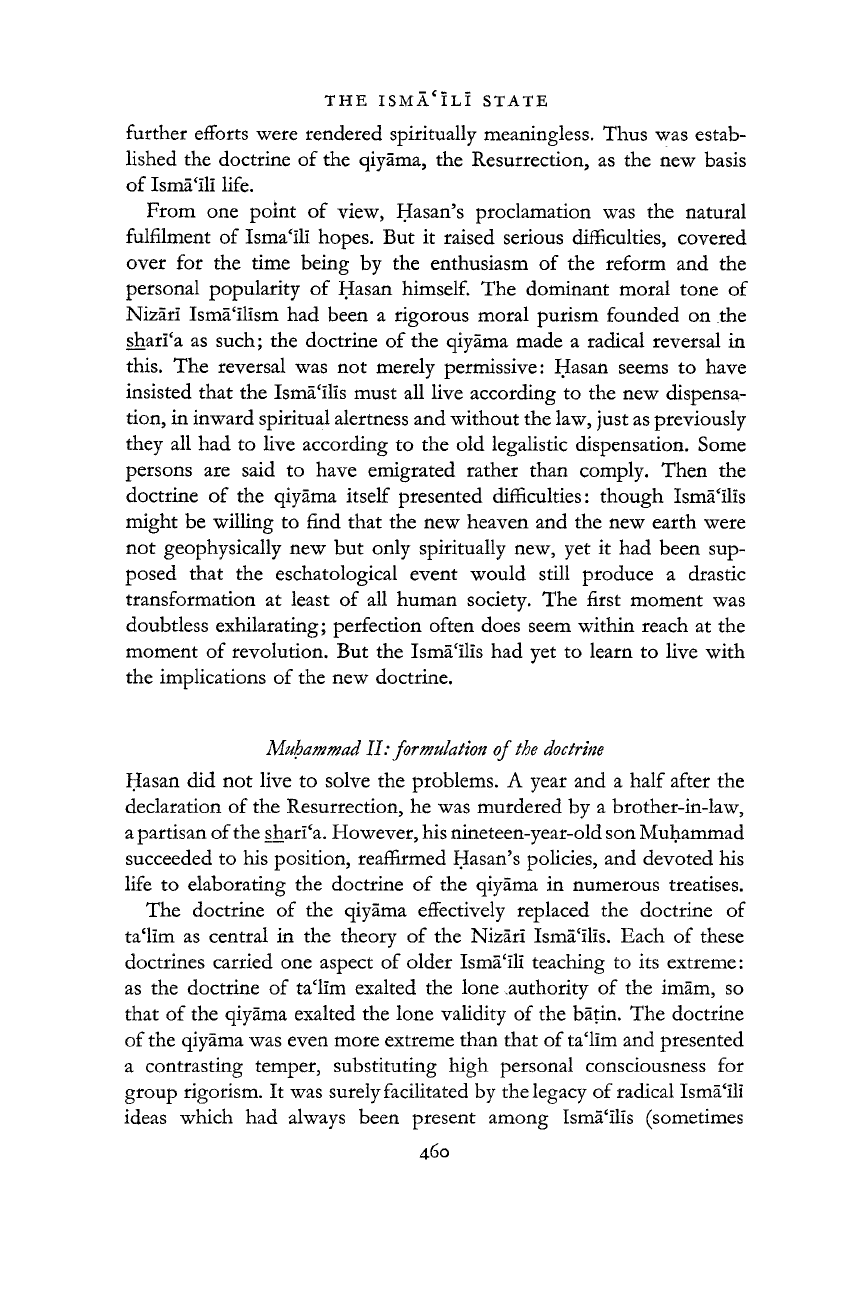
THE
ISMA'ÌLÌ
STATE
further efforts were rendered spiritually meaningless. Thus was estab-
lished the doctrine of the qiyama, the Resurrection, as the new basis
of
Isma'ili
life.
From one point of
view,
Hasan's proclamation was the
natural
fulfilment
of Isma'ili hopes. But it raised serious difficulties, covered
over
for the time being by the enthusiasm of the reform and the
personal popularity of Hasan himself. The dominant moral tone of
Nizari
Isma'ilism had been a rigorous moral purism founded on the
shari'a as such; the doctrine of the qiyama made a radical reversal in
this. The reversal was not merely permissive: Hasan seems to have
insisted
that
the Isma'ilis must all
live
according to the new dispensa-
tion, in inward spiritual alertness and without the law, just as previously
they all had to
live
according to the old legalistic dispensation. Some
persons are said to have emigrated
rather
than
comply. Then the
doctrine of the qiyama itself presented difficulties: though Isma'ilis
might be
willing
to find
that
the new heaven and the new
earth
were
not geophysically new but only spiritually new, yet it had been sup-
posed
that
the eschatological event would still produce a drastic
transformation at least of all human society. The first moment was
doubtless exhilarating; perfection often does seem within reach at the
moment of revolution. But the Isma'ilis had yet to learn to
live
with
the implications of the new doctrine.
Muhammad II: formulation of
the
doctrine
Hasan did not
live
to solve the problems. A year and a half after the
declaration of the Resurrection, he was murdered by a brother-in-law,
a partisan
of
the shari'a. However, his nineteen-year-old son Muhammad
succeeded to his position, reaffirmed Hasan's policies, and devoted his
life
to elaborating the doctrine of the qiyama in numerous treatises.
The
doctrine of the qiyama
effectively
replaced the doctrine of
ta'lim as central in the theory of the Nizari Isma'ilis. Each of these
doctrines carried one aspect of older Isma'ili teaching to its extreme:
as the doctrine of ta'lim exalted the lone .authority of the imam, so
that
of the qiyama exalted the lone validity of the batin. The doctrine
of
the qiyama was even more extreme
than
that
of ta'lim and presented
a contrasting temper, substituting high personal consciousness for
group rigorism. It was surely facilitated by the
legacy
of radical Isma'ili
ideas which had always been present among Isma'ilis (sometimes
460
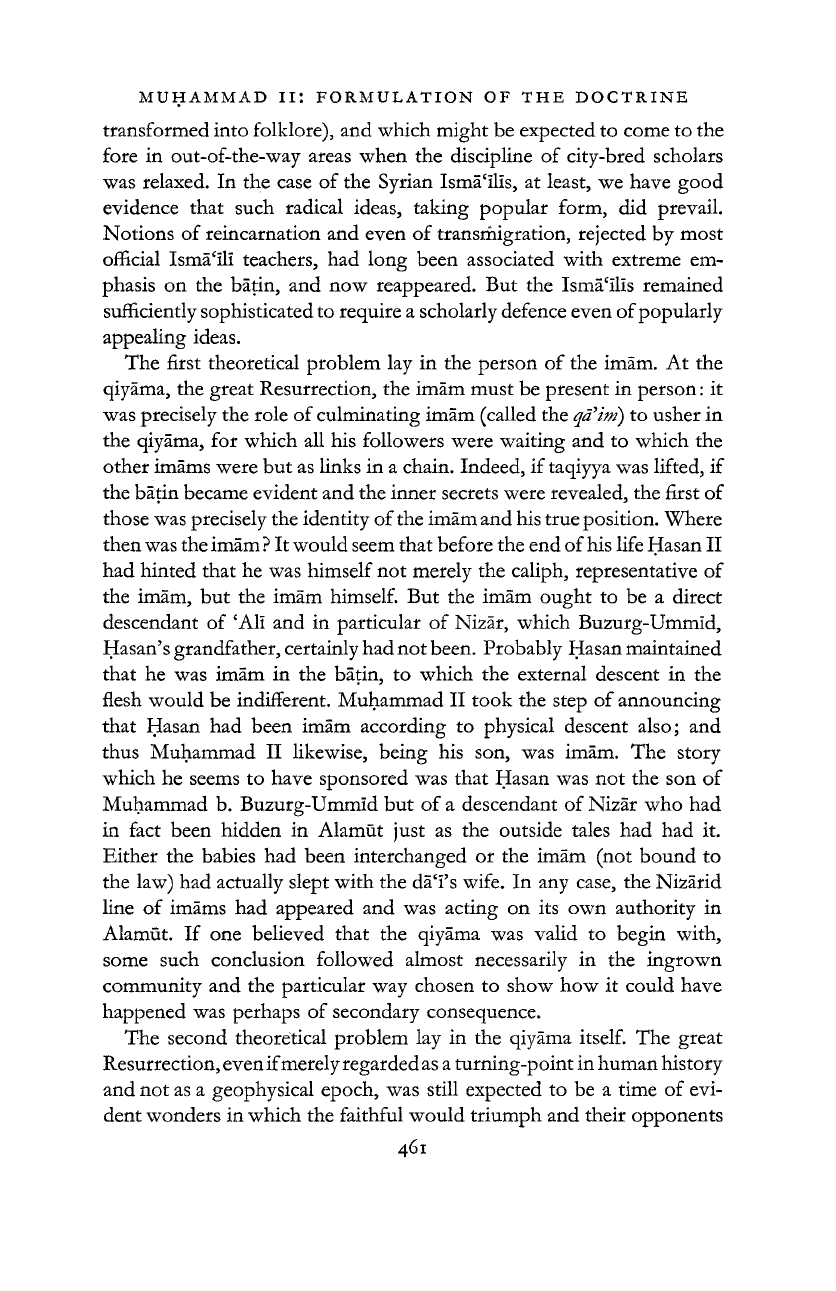
MUHAMMAD
II:
FORMULATION
OF THE DOCTRINE
transformed into folklore), and which might be expected to come to the
fore in out-of-the-way areas when the discipline of city-bred scholars
was
relaxed. In the case of the Syrian Isma'ilis, at least, we have good
evidence
that
such radical ideas, taking popular form, did prevail.
Notions of reincarnation and even of transmigration, rejected by most
official
Isma'ili teachers, had long been associated with extreme em-
phasis on the batin, and now reappeared. But the Isma'ilis remained
sufficiently
sophisticated to require a scholarly defence even
of
popularly
appealing ideas.
The
first theoretical problem lay in the person of the imam. At the
qiyama, the great Resurrection, the imam must be present in person: it
was
precisely the role of culminating imam (called the qd'ini) to usher in
the qiyama, for which all his followers were waiting and to which the
other imams were but as links in a chain. Indeed, if taqiyya was lifted, if
the batin became evident and the inner secrets were revealed, the first of
those was precisely the identity of the imam and his
true
position. Where
then
was
the imam
?
It would seem
that
before the end
of
his
life
Hasan II
had hinted
that
he was himself not merely the caliph, representative of
the imam, but the imam himself. But the imam ought to be a direct
descendant of 'Ali and in particular of Nizar, which Buzurg-Ummid,
Hasan's grandfather, certainly had not been. Probably Hasan maintained
that
he was imam in the batin, to which the external descent in the
flesh
would
be indifferent. Muhammad II took the step of announcing
that
Hasan had been imam according to physical descent also; and
thus
Muhammad II
likewise,
being his son, was imam. The story
which
he seems to have sponsored was
that
Hasan was not the son of
Muhammad b. Buzurg-Ummid but of a descendant of Nizar who had
in fact been hidden in Alamut just as the outside tales had had it.
Either the babies had been interchanged or the imam (not bound to
the law) had actually slept with the da'i's
wife.
In any case, the Nizarid
line of imams had appeared and was acting on its own authority in
Alamut.
If one believed
that
the qiyama was valid to begin with,
some such conclusion
followed
almost necessarily in the ingrown
community and the particular way chosen to show how it could have
happened was perhaps of secondary consequence.
The
second theoretical problem lay in the qiyama itself. The great
Resurrection,
even
if
merely regarded as a turning-point in human history
and not as a geophysical epoch, was still expected to be a time of
evi-
dent wonders in which the faithful would
triumph
and their opponents
461
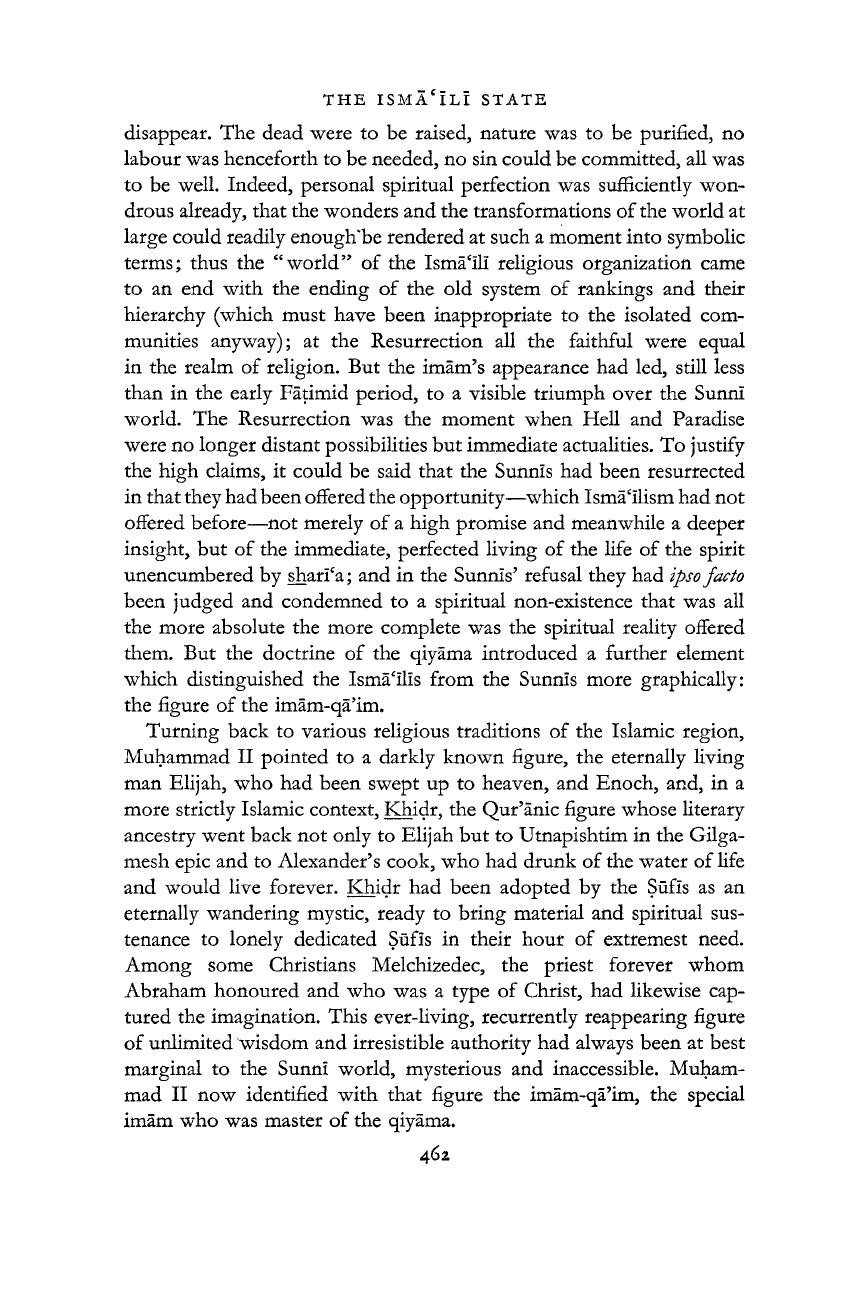
THE
ISMA'ILI
STATE
462
disappear. The dead were to be raised,
nature
was to be purified, no
labour was henceforth to be needed, no sin could be committed, all was
to be
well.
Indeed, personal spiritual perfection was sufficiently won-
drous already,
that
the wonders and the transformations of the world at
large
could readily enougrfbe rendered at such a moment into symbolic
terms;
thus
the " world" of the Isma'IlI religious organization came
to an end with the ending of the old system of rankings and their
hierarchy (which must have been inappropriate to the isolated com-
munities anyway); at the Resurrection all the faithful were equal
in the realm of religion. But the imam's appearance had led, still less
than
in the early Fatimid period, to a visible
triumph
over the Sunni
world.
The Resurrection was the moment when Hell and Paradise
were
no longer
distant
possibilities but immediate actualities. To justify
the high claims, it could be said
that
the Sunnis had been resurrected
in
that
they had been offered the opportunity—which Isma'Ilism had not
offered
before—not merely of a high promise and meanwhile a deeper
insight, but of the immediate, perfected living of the
life
of the spirit
unencumbered by sharfa; and in the Sunnis' refusal they had ipso facto
been judged and condemned to a spiritual non-existence
that
was all
the more absolute the more complete was the spiritual reality offered
them. But the doctrine of the qiyama introduced a further element
which
distinguished the Isma'ills from the Sunnis more graphically:
the figure of the imam-qa'im.
Turning back to various religious traditions of the Islamic region,
Muhammad II pointed to a darkly known figure, the eternally living
man Elijah, who had been swept up to heaven, and Enoch, and, in a
more strictly Islamic context, Khidr, the Qur'anic figure whose literary
ancestry went back not only to Elijah but to Utnapishtim in the
Gilga-
mesh epic and to Alexander's cook, who had
drunk
of the water of
life
and would
live
forever. Khidr had been adopted by the Sufis as an
eternally wandering mystic, ready to bring material and spiritual sus-
tenance to lonely dedicated Sufis in their hour of extremest need.
Among
some Christians Melchizedec, the priest forever whom
Abraham
honoured and who was a type of Christ, had likewise cap-
tured
the imagination. This ever-living, recurrently reappearing figure
of
unlimited
^wisdom
and irresistible authority had always been at best
marginal to the Sunni world, mysterious and inaccessible. Muham-
mad II now identified with
that
figure the imam-qa'im, the special
imam who was master of the qiyama.
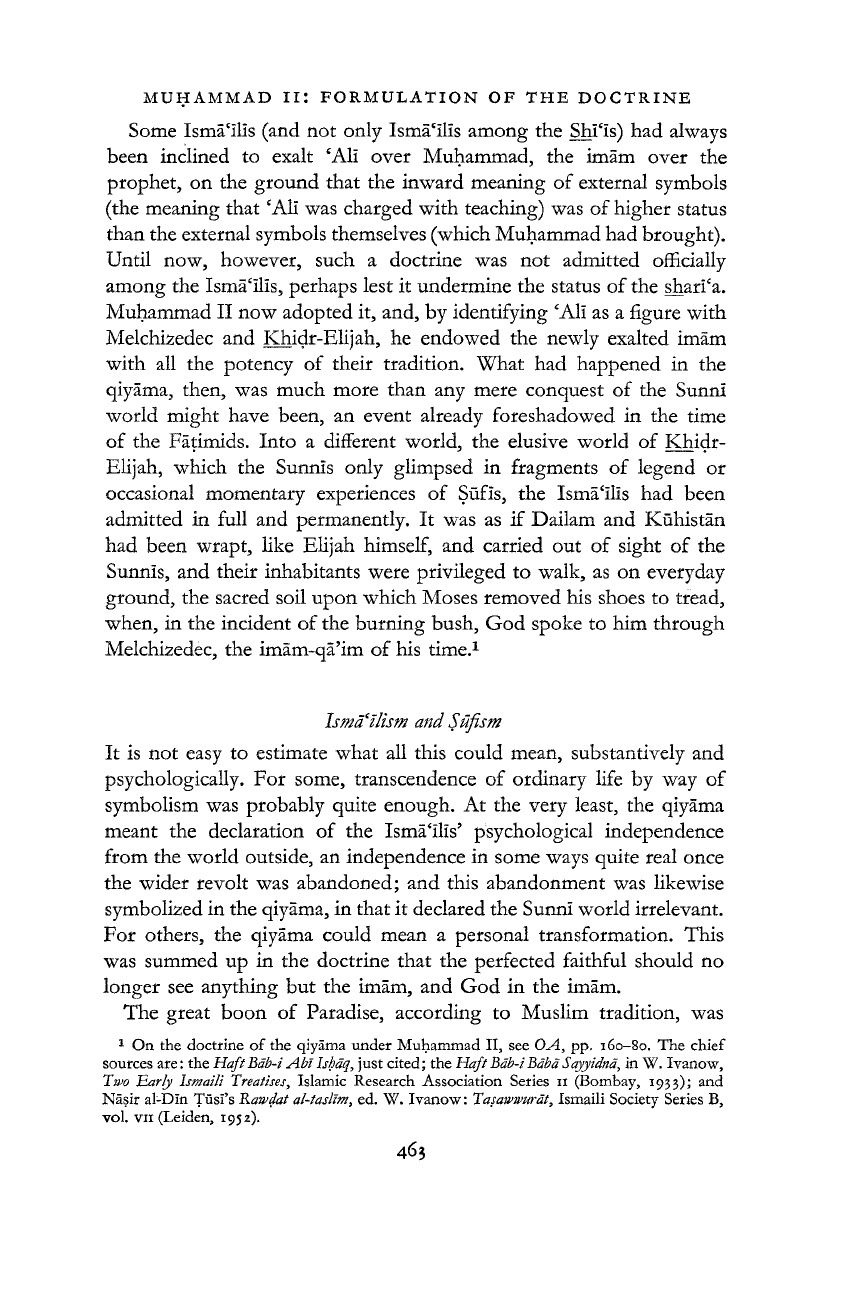
MUHAMMAD
II:
FORMULATION
OF THE
DOCTRINE
Some
Isma'ilis (and
not
only Isma'Ilis among
the
ShFis) had always
been inclined
to
exalt
'Ali
over Muhammad,
the
imam over
the
prophet,
on the
ground
that
the
inward meaning
of
external symbols
(the meaning
that
c
Ali
was charged with teaching) was of higher
status
than
the external symbols themselves (which Muhammad had brought).
Until
now,
however, such
a
doctrine
was not
admitted
officially
among the Isma'ilis, perhaps lest
it
undermine the
status
of the shari'a.
Muhammad
II
now adopted it, and, by identifying
c
Ali
as
a
figure with
Melchizedec
and
Khidr-Elijah,
he
endowed
the
newly exalted imam
with
all the
potency
of
their tradition. What
had
happened
in the
qiyama,
then, was much more
than
any
mere conquest
of the
Sunni
world
might have been,
an
event already foreshadowed
in the
time
of
the
Fatimids.
Into
a
different world,
the
elusive world
of
Khidr-
Elijah,
which
the
Sunnis only glimpsed
in
fragments
of
legend
or
occasional
momentary experiences
of
Sufis,
the
Isma'ilis
had
been
admitted
in
full
and
permanently.
It
was
as if
Dailam
and
Kuhistan
had been wrapt, like Elijah himself,
and
carried
out of
sight
of the
Sunnis,
and their
inhabitants
were privileged
to
walk,
as on
everyday
ground,
the
sacred soil upon which Moses removed his shoes
to
tread,
when,
in
the incident of the burning bush, God spoke
to
him through
Melchizedec,
the
imam-qa'im
of
his time.
1
Isma'ilism
and
Sufism
It
is not
easy
to
estimate what
all
this could mean, substantively
and
psychologically.
For
some, transcendence
of
ordinary
life
by
way
of
symbolism
was probably quite enough.
At the
very least,
the
qiyama
meant
the
declaration
of the
Isma'ilis' psychological independence
from
the world outside,
an
independence
in
some ways quite real once
the wider revolt was abandoned;
and
this abandonment was likewise
symbolized
in the qiyama, in
that
it
declared the Sunni world irrelevant.
For others,
the
qiyama could mean
a
personal transformation. This
was
summed
up in the
doctrine
that
the
perfected faithful should
no
longer
see anything
but the
imam,
and
God
in the
imam.
The
great boon
of
Paradise, according
to
Muslim tradition,
was
1
On the
doctrine
of the
qiyama
under
Muhammad
II, see OA, pp. 160-80. The
chief
sources are:
the
Haft
Bdb-i
Abi
Ishaq,
just cited;
the
Haft
Bdb-iBdbd
Sayyidna,
in W.
Ivanow,
Two Early Ismaili Treatises,
Islamic Research Association Series
11
(Bombay,
1933);
and
Nasir al-Dln Tusi's
Rawdat
al-taslim, ed. W.
Ivanow:
Tasawwurat,
Ismaili Society Series
B,
vol.
VII (Leiden,
1952).
463
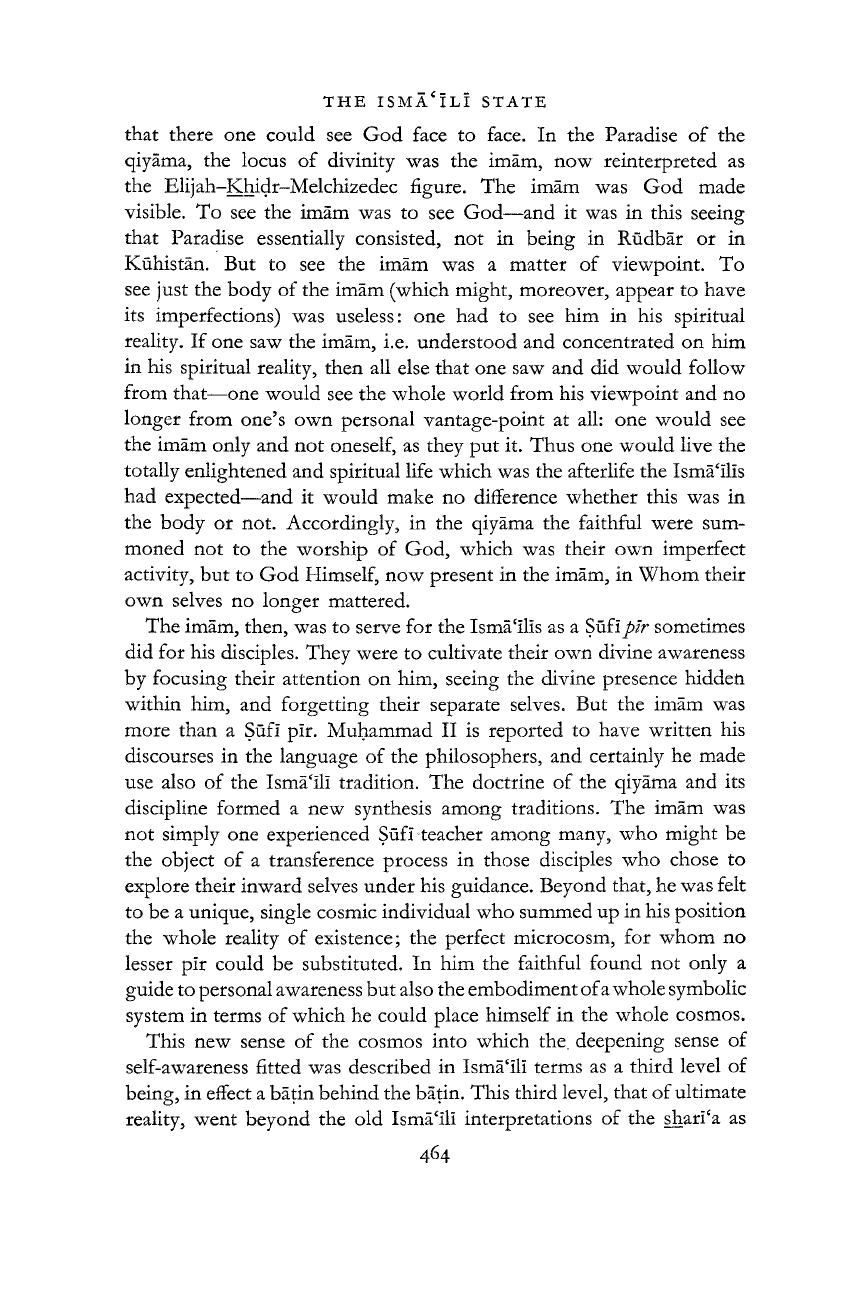
THE
ISMA'ILI
STATE
464
that
there
one could see God face to
face.
In the Paradise of the
qiyama, the locus of divinity was the imam, now reinterpreted as
the Eli)ah-Khidr-Melchizedec figure. The imam was God made
visible.
To see the imam was to see God—and it was in this seeing
that
Paradise essentially consisted, not in being in Rudbar or in
Kuhistan. But to see the imam was a matter of viewpoint. To
see just the body of the imam (which might, moreover, appear to have
its imperfections) was useless: one had to see him in his spiritual
reality. If one saw the imam, i.e. understood and concentrated on him
in his spiritual reality, then all else
that
one saw and did would
follow
from that—one would see the whole world from his viewpoint and no
longer from one's own personal vantage-point at all: one would see
the imam only and not oneself, as they put it. Thus one would
live
the
totally enlightened and spiritual
life
which was the afterlife the Isma'ills
had expected—and it would make no difference whether this was in
the body or not. Accordingly, in the qiyama the faithful were sum-
moned not to the worship of God, which was their own imperfect
activity,
but to God Himself, now present in the imam, in Whom their
own
selves no longer mattered.
The
imam, then, was to serve for the Isma'ills as a Sufipir sometimes
did for his disciples. They were to cultivate their own divine awareness
by
focusing their attention on him, seeing the divine presence hidden
within him, and forgetting their separate selves. But the imam was
more
than
a Sufi pir. Muhammad II is reported to have written his
discourses in the language of the philosophers, and certainly he made
use also of the Isma'lli tradition. The doctrine of the qiyama and its
discipline formed a new synthesis among traditions. The imam was
not simply one experienced Sufi teacher among many, who might be
the object of a transference process in those disciples who chose to
explore their inward selves under his guidance. Beyond
that,
he was felt
to be a unique, single cosmic individual who summed up in his position
the whole reality of existence; the perfect microcosm, for whom no
lesser pir could be substituted. In him the faithful found not only a
guide to personal awareness but also the embodiment
of
a
whole
symbolic
system in terms of which he could place himself in the whole cosmos.
This
new sense of the cosmos into which the. deepening sense of
self-awareness fitted was described in Isma'ili terms as a
third
level
of
being,
in effect a batin behind the batin. This
third
level,
that
of ultimate
reality, went beyond the old Isma'ili interpretations of the sharfa as
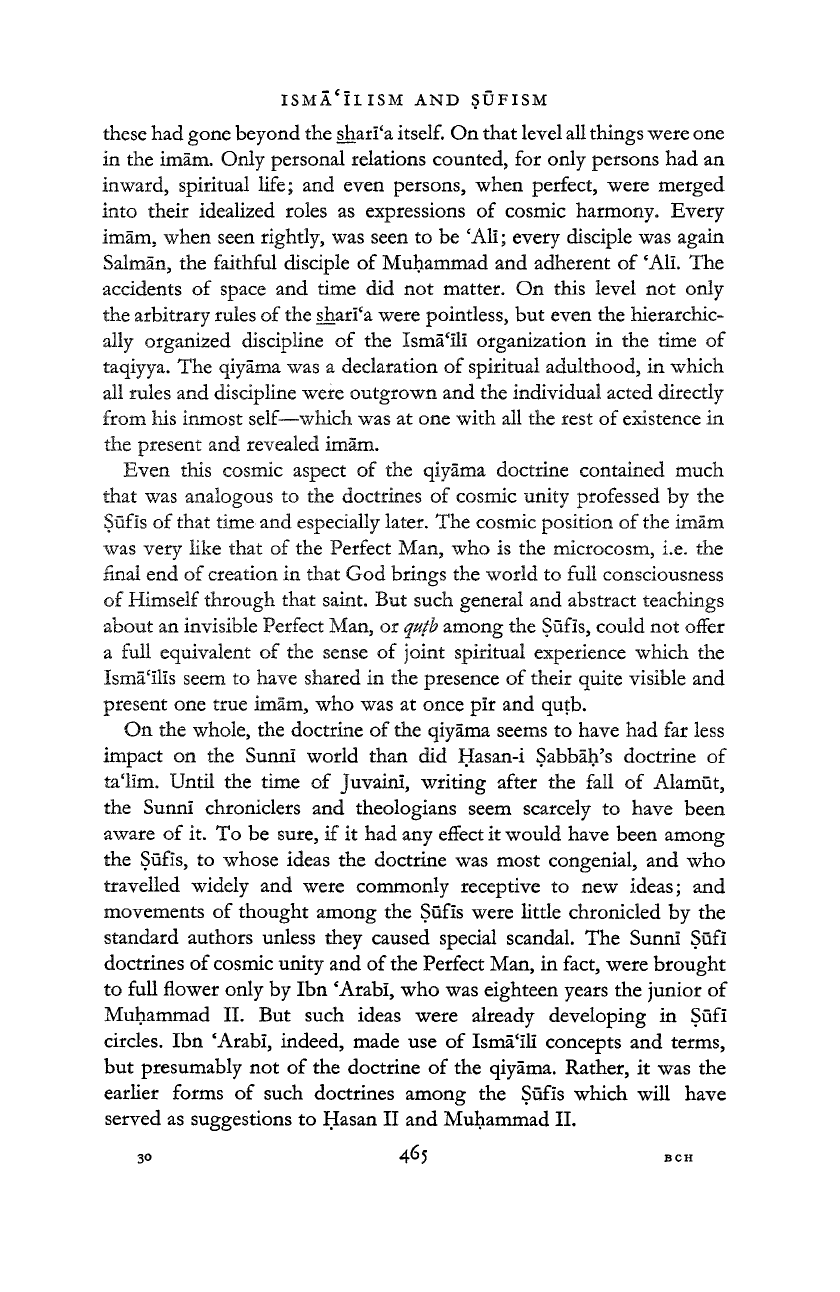
ISMA'IIISM
AND
SUFISM
these had gone beyond the sharfa itself. On
that
level
all things were one
in the imam. Only personal relations counted, for only persons had an
inward, spiritual
life;
and even persons, when perfect, were merged
into their idealized roles as expressions of cosmic harmony. Every
imam, when seen rightly, was seen to be
'All;
every disciple was again
Salman, the faithful disciple of Muhammad and
adherent
of
'AH.
The
accidents of space and time did not
matter.
On this
level
not only
the arbitrary rules of the sharfa were pointless, but even the hierarchic-
ally
organized discipline of the Isma'ili organization in the time of
taqiyya.
The qiyama was a declaration of spiritual adulthood, in which
all
rules and discipline were outgrown and the individual acted directly
from his inmost self—which was at one with all the rest of existence in
the present and revealed imam.
Even
this cosmic aspect of the qiyama doctrine contained much
that
was analogous to the doctrines of cosmic unity professed by the
Sufis
of
that
time and especially later. The cosmic position of the imam
was
very like
that
of the Perfect Man, who is the microcosm, i.e. the
final
end of creation in
that
God brings the world to full consciousness
of
Himself through
that
saint. But such general and abstract teachings
about an invisible Perfect Man, or qutb among the
Sufis,
could not offer
a full equivalent of the sense of joint spiritual experience which the
Isma'ilis seem to have shared in the presence of their quite visible and
present one
true
imam, who was at once pir and qutb.
On
the whole, the doctrine of the qiyama seems to have had far less
impact on the Sunni world
than
did Hasan-i Sabbah's doctrine of
ta'lim. Until the time of Juvaini, writing after the
fall
of Alamut,
the Sunni chroniclers and theologians seem scarcely to have been
aware of it. To be sure, if it had any effect it would have been among
the
Sufis,
to whose ideas the doctrine was most congenial, and who
travelled widely and were commonly receptive to new ideas; and
movements of thought among the Sufis were little chronicled by the
standard
authors
unless they caused special scandal. The Sunni Sufi
doctrines of cosmic unity and of the Perfect Man, in fact, were brought
to full flower only by Ibn 'Arabi, who was eighteen years the junior of
Muhammad II. But such ideas were already developing in Sufi
circles.
Ibn 'Arabi, indeed, made use of Isma'ili concepts and terms,
but presumably not of the doctrine of the qiyama. Rather, it was the
earlier forms of such doctrines among the Sufis which
will
have
served as suggestions to Hasan II and Muhammad II.
30 465 BCH
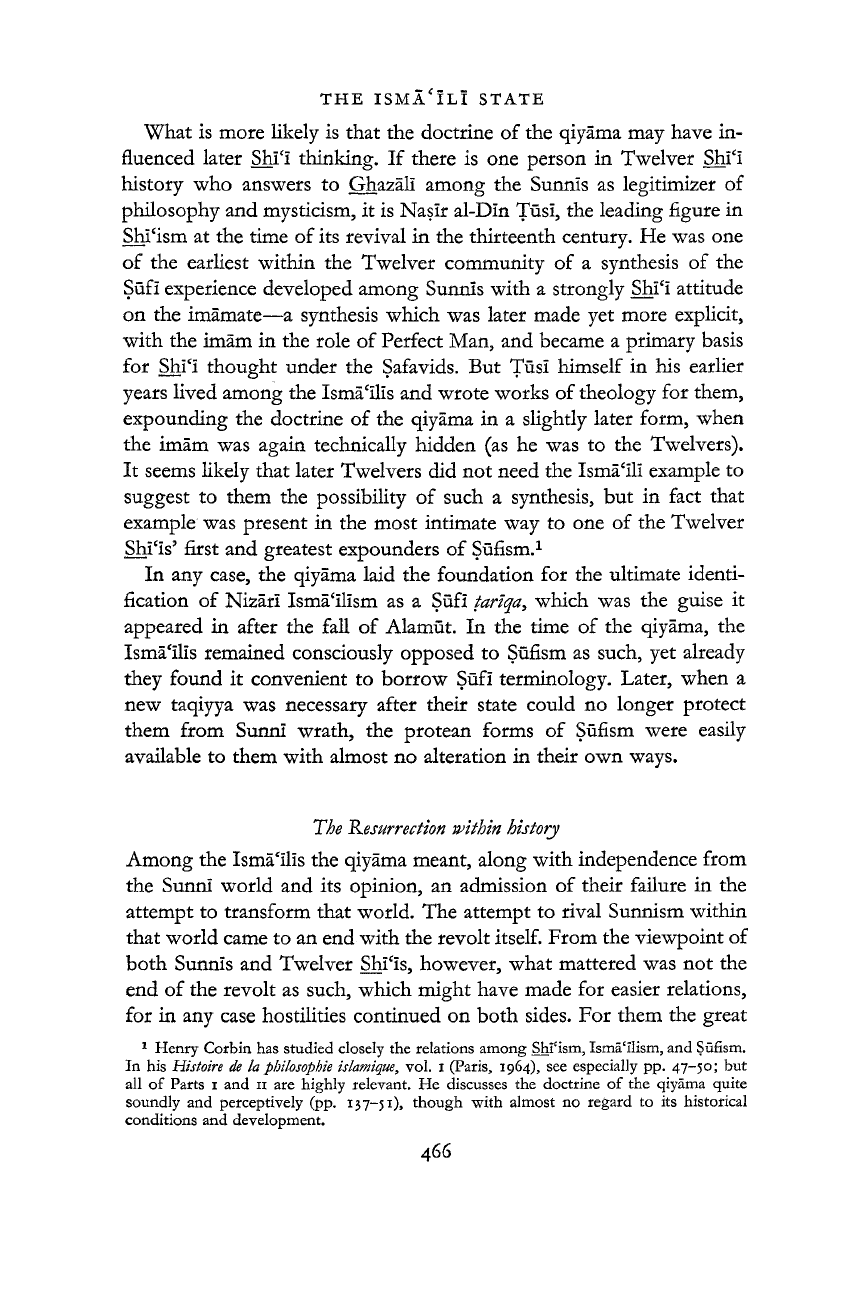
THE
ISMA'ILI
STATE
466
What is more likely is
that
the doctrine of the qiyama may have in-
fluenced
later Shi'i thinking. If there is one person in Twelver Shi'i
history who answers to Ghazali among the Sunnis as legitimizer of
philosophy and mysticism, it is Nasir al-Din Tusi, the leading figure in
Shi'ism
at the time of its revival in the thirteenth century. He was one
of
the earliest within the Twelver community of a synthesis of the
Sufi
experience developed among Sunnis with a strongly Shi
c
i attitude
on the imamate—a synthesis which was later made yet more explicit,
with
the imam in the role of Perfect Man, and became a primary basis
for
Shi'i thought under the Safavids. But Tusi himself in his earlier
years lived among the Isma'ilis and wrote works of theology for them,
expounding the doctrine of the qiyama in a slightly later form, when
the imam was again technically hidden (as he was to the Twelvers).
It seems likely
that
later Twelvers did not need the Isma'ili example to
suggest
to them the possibility of such a synthesis, but in fact
that
example was present in the most intimate way to one of the Twelver
Ships'
first and greatest expounders of Sufism.
1
In any case, the qiyama laid the foundation for the ultimate identi-
fication
of
Nizari Isma'ilism as a Sufi tariqa, which was the guise it
appeared in after the
fall
of Alamut. In the time of the qiyama, the
Isma'ilis remained consciously opposed to Sufism as such, yet already
they found it convenient to borrow Sufi terminology. Later, when a
new taqiyya was necessary after their state could no longer protect
them from Sunni wrath, the protean forms of Sufism were easily
available
to them with almost no alteration in their own
ways.
The
Resurrection
within
history
Among
the Isma'ilis the qiyama meant, along with independence from
the Sunni world and its opinion, an admission of their failure in the
attempt to transform
that
world. The attempt to rival Sunnism within
that
world came to an end with the revolt itself. From the viewpoint of
both Sunnis and Twelver ShFis, however, what mattered was not the
end of the revolt as such, which might have made for easier relations,
for
in any case hostilities continued on both sides. For them the great
1
Henry Corbin has studied closely the relations among Shfism, Isma'ilism, and Sufism.
In
his Histoire de la
philosophie
islamique,
vol.
I
(Paris,
1964), see
especially
pp. 47-50; but
all of
Parts
1 and 11 are highly relevant. He discusses the doctrine of the qiyama quite
soundly and perceptively (pp.
137-51),
though with almost no regard to its historical
conditions and development.
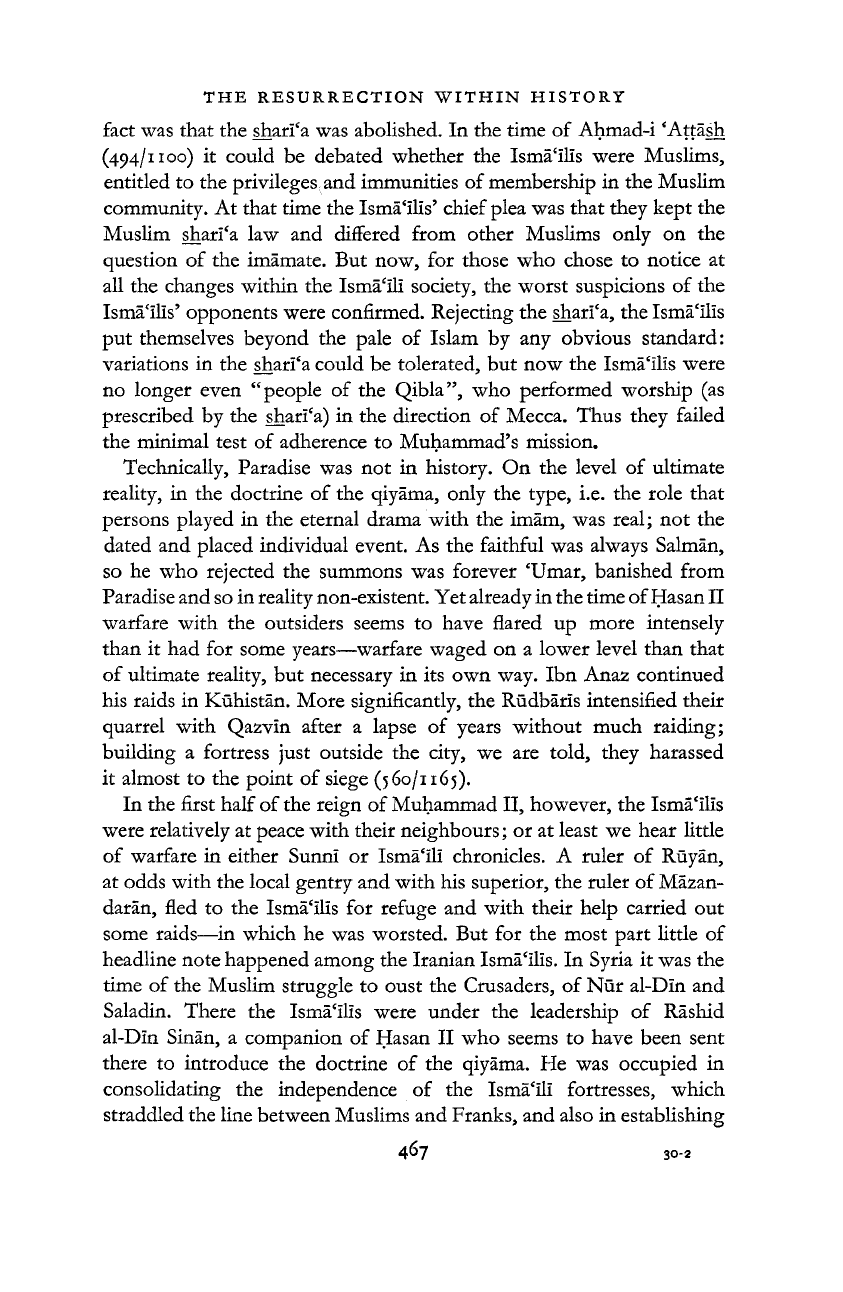
THE
RESURRECTION
WITHIN
HISTORY
fact
was
that
the sharf a was abolished. In the time of Ahmad-i 'Attash
(494/1100)
it could be debated whether the Isma'llls were Muslims,
entitled to the privileges and immunities of membership in the Muslim
community. At
that
time the Isma'llls'
chief
plea was
that
they kept the
Muslim
sharf a law and differed from other Muslims only on the
question of the imamate. But now, for those who chose to notice at
all
the changes within the Isma'lU society, the worst suspicions of the
Isma'llls'
opponents were confirmed. Rejecting the sharf a, the Isma'llls
put themselves beyond the pale of Islam by any obvious
standard:
variations in the sharf a could be tolerated, but now the Isma'llls were
no longer even "people of the Qibla", who performed worship (as
prescribed by the sharf a) in the direction of
Mecca.
Thus they failed
the minimal test of adherence to Muhammad's mission.
Technically,
Paradise was not in history. On the
level
of ultimate
reality, in the doctrine of the qiyama, only the type, i.e. the role
that
persons played in the eternal drama with the imam, was real; not the
dated and placed individual event. As the faithful was always Salman,
so he who rejected the summons was forever 'Umar, banished from
Paradise and so in reality non-existent.
Yet
already in the time
of
Hasan II
warfare with the outsiders seems to have flared up more intensely
than
it had for some years—warfare waged on a lower
level
than
that
of
ultimate reality, but necessary in its own way. Ibn
Anaz
continued
his raids in Kuhistan. More significantly, the Rudbarls intensified their
quarrel with
Qazvin
after a lapse of years without much raiding;
building a fortress just outside the city, we are told, they harassed
it almost to the point of siege
(560/1165).
In the first half of the reign of Muhammad II, however, the Isma'llls
were relatively at peace with their neighbours; or at least we hear little
of
warfare in either SunnI or Isma'Ill chronicles. A ruler of Ruyan,
at odds with the local gentry and with his superior, the ruler of Mazan-
daran,
fled to the Isma'llls for refuge and with their help carried out
some raids—in which he was worsted. But for the most
part
little of
headline note happened among the
Iranian
Isma'llls. In Syria it was the
time of the Muslim struggle to oust the Crusaders, of Nur al-Dln and
Saladin. There the Isma'llls were
under
the leadership of Rashid
al-Dln
Sinan, a companion of Hasan II who seems to have been sent
there
to introduce the doctrine of the qiyama. He was occupied in
consolidating the independence of the Isma'Ill fortresses, which
straddled the line between Muslims and Franks, and also in establishing
467
30-2
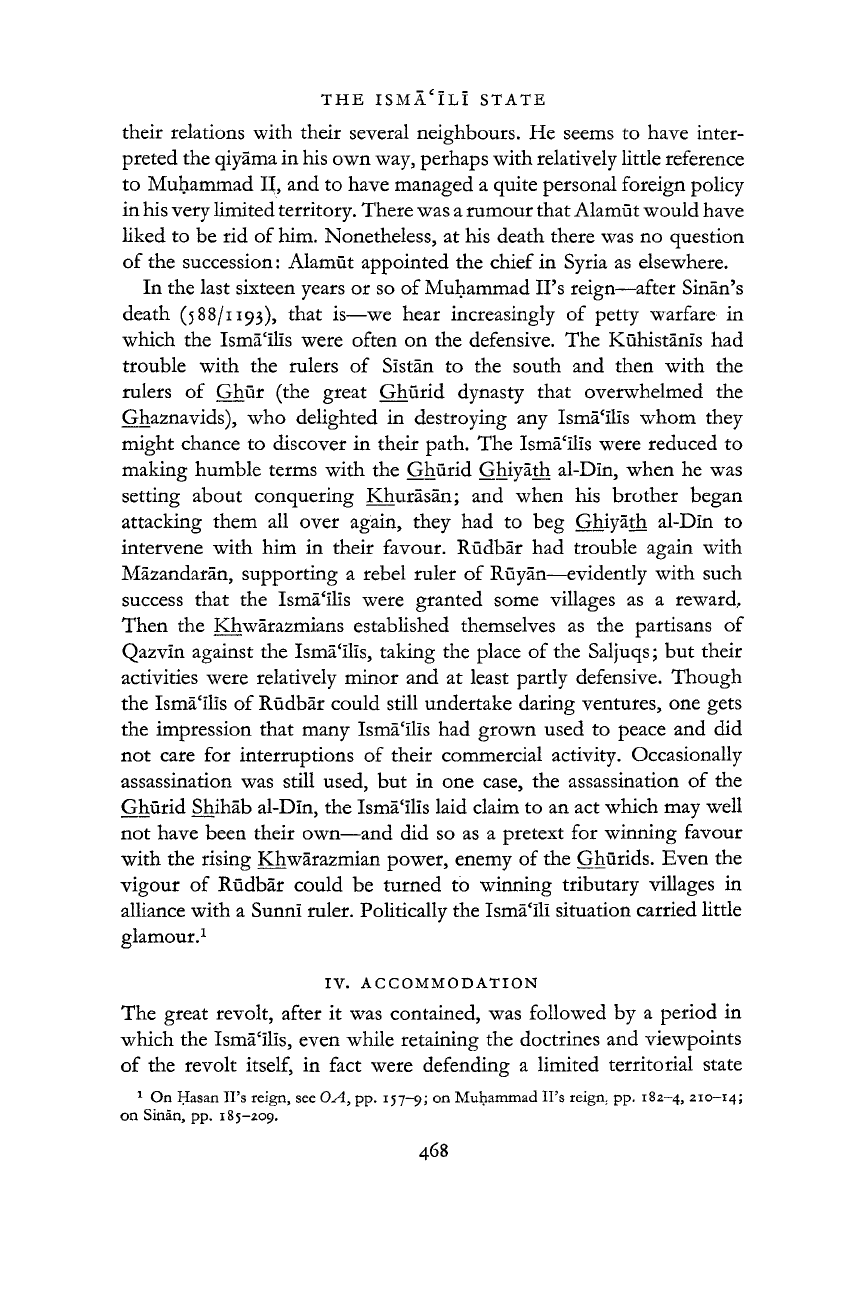
THE
ISMÁ'ÍLÍ
STATE
468
their relations with their several neighbours. He seems to have
inter-
preted the qiyarna in his own
way,
perhaps with relatively little reference
to Muhammad II, and to have managed a quite personal foreign policy
in his very limited territory. There was a
rumour
that
Alamüt would have
liked
to be rid of him. Nonetheless, at his death
there
was no question
of
the succession: Alamüt appointed the
chief
in Syria as elsewhere.
In the last sixteen years or so of Muhammad IPs reign—after Sinán's
death (588/1193),
that
is—we hear increasingly of petty warfare in
which
the Isma'ilis were often on the defensive. The Kühistánis had
trouble with the rulers of
Sistán to the south and
then
with the
rulers of
Ghür (the great Ghürid dynasty
that
overwhelmed the
Ghaznavids),
who delighted in destroying any Isma'ilis whom they
might chance to discover in their
path.
The Isma'ilis were reduced to
making humble
terms
with the Ghürid Ghiyáth al-Din, when he was
setting about conquering Khurasan; and when his
brother
began
attacking them all over again, they had to beg
Ghiyáth al-Din to
intervene with him in their favour.
Rüdbár had trouble again with
Mázandarán, supporting a rebel ruler of Rüyán—evidently with such
success
that
the Isma'ilis were granted some villages as a reward.
Then the
Khwárazmians established themselves as the
partisans
of
Qazvin
against the Isma'ilis, taking the place of the Saljuqs; but their
activities
were relatively minor and at least partly defensive. Though
the Isma'ilis of
Rüdbár could still undertake daring ventures, one gets
the impression
that
many Isma'ilis had grown used to peace and did
not care for
interruptions
of their commercial activity. Occasionally
assassination was still used, but in one case, the assassination of the
Ghürid Shiháb al-Din, the Isma'ilis laid claim to an act which may
well
not have been their own—and did so as a pretext for winning favour
with
the rising Khwárazmian power, enemy of the Ghürids. Even the
vigour
of Rüdbár could be
turned
to winning
tributary
villages in
alliance with a Sunni ruler. Politically the
Ismá'ili situation carried little
glamour.
1
IV.
ACCOMMODATION
The
great revolt, after it was contained, was followed by a period in
which
the Isma'ilis, even while retaining the doctrines and viewpoints
of
the revolt itself, in fact were defending a limited territorial
state
1
On Hasan II's reign, see OA, pp.
157-9;
on Muhammad II's reign, pp.
182-4,
210-14;
on Sinán, pp.
185-209.
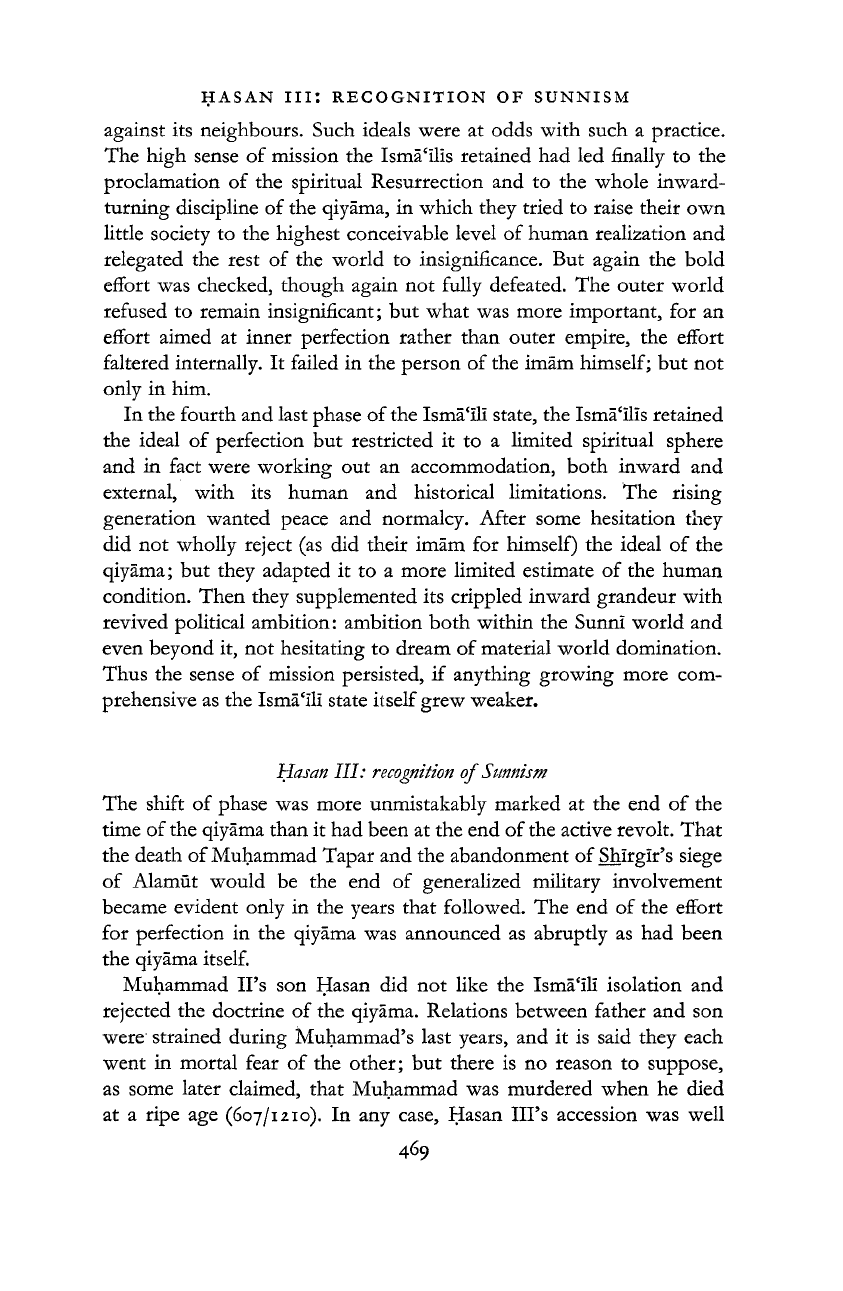
HASAN
III: RECOGNITION OF SUNNISM
against its neighbours. Such ideals were at odds with such a practice.
The
high sense of mission the Isma'llls retained had led finally to the
proclamation of the spiritual Resurrection and to the whole inward-
turning discipline of the qiyama, in which they tried to raise their own
little society to the highest conceivable
level
of human realization and
relegated the rest of the world to insignificance. But again the bold
effort
was checked, though again not
fully
defeated. The outer world
refused to remain insignificant; but what was more important, for an
effort
aimed at inner perfection
rather
than
outer empire, the effort
faltered internally. It failed in the person of the imam himself; but not
only
in him.
In the fourth and last phase of the Isma'Ill state, the Isma'llls retained
the ideal of perfection but restricted it to a limited spiritual sphere
and in fact were working out an accommodation, both inward and
external, with its human and historical limitations. The rising
generation wanted peace and normalcy.
After
some hesitation they
did not
wholly
reject (as did their imam for himself) the ideal of the
qiyama; but they adapted it to a more limited estimate of the human
condition. Then they supplemented its crippled inward grandeur with
revived
political ambition: ambition both within the Sunnl world and
even
beyond it, not hesitating to dream of material world domination.
Thus the sense of mission persisted, if anything growing more com-
prehensive as the Isma'Ill
state
itself grew weaker.
Hasan III:
recognition
of
Sunnism
The
shift of phase was more unmistakably marked at the end of the
time of the qiyama
than
it had been at the end of the active revolt. That
the death of Muhammad Tapar and the abandonment of Shirglr's siege
of
Alamut would be the end of generalized military involvement
became evident only in the years
that
followed.
The end of the effort
for
perfection in the qiyama was announced as abruptly as had been
the qiyama itself.
Muhammad II's son Hasan did not like the Isma'Ill isolation and
rejected the doctrine of the qiyama. Relations between father and son
were
strained during Muhammad's last years, and it is said they each
went in mortal fear of the other; but
there
is no reason to suppose,
as some later claimed,
that
Muhammad was murdered when he died
at a ripe age
(607/1210).
In any case, Hasan Ill's accession was
well
469
